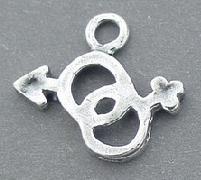Did the God of the Bible Have a Female Goddess Companion?
 According to TDVC...
According to TDVC..."Early Jews believed that the Holy of Holies in Solomon's Temple housed not only God but also His powerful female equal, Shekinah." (Page 309)
The Truth - EXPOSED!!!
Such a position is absurd, and can be easily answered with two primary points:
- The Bible steadfastly argues for monotheism (belief in one God)
- The "Shekinah" refers only to the glory of God, not to some "powerful female equal."
1. The Bible steadfastly argues for monotheism (belief in one God).
The fact that there is only one true God is the consistent testimony of Scripture from Genesis to Revelation. It is like a thread that runs through every page of the Bible. An early Hebrew confession of faith - the Shema - is an example of this consistent emphasis:
"Hear, O Israel: The lord our God is one lord"
~ Deuteronomy 6:4 ~
~ Deuteronomy 6:4 ~
In a culture saturated with false gods and idols, the Shema would have been particularly meaningful for the Israelites. In the Song of Moses, which Moses recited to the whole assembly of Israel following the "Exodus" from Egypt, we find God's own words worshipfully repeated:
"See now that I, even I, am he, and there is no god with me: I kill, and I make alive; I wound, and I heal: neither is there any that can deliver out of my hand"
~ Deuteronomy 32:39 ~
~ Deuteronomy 32:39 ~
The God of the Bible is without rival.
After God had made some astonishing promises to David (see 2 Samuel 7:12-16), David responded by offering praise to God:
"Wherefore thou art great, O lord God: for there is none like thee, neither is there any God beside thee, according to all that we have heard with our ears"
~ 2 Samuel 7:22 ~
~ 2 Samuel 7:22 ~
Later, in the form of a psalm, David again praised God with the words, "For thou art great, and doest wondrous things: thou art God alone" (Psalm 86:10).
God Himself positively affirmed through Isaiah the prophet, "I am the first, and I am the last; and beside me there is no God" (Isaiah 44:6; see also 37:20; 43:10; 45:5, 14, 21-22).
The Book of Isaiah shows us that God often demonstrated that He alone is God by foretelling the future - something that false pagan gods could never do (Isaiah 46:8-10).
The oneness of God is also often emphasized in the New Testament.
"an idol is nothing in the world, and that there is none other God but one." ~ 1 Corinthians 8:4 ~
You believe that there is one God. Good! Even the demons believe that—and shudder. ~ James 2:19 ~
These and a multitude of other verses (for example, John 5:44; 17:3; Romans 3:29-30; 16:27; Galatians 3: 20; Ephesians 4:6; 1 Thessalonians 1:9; 1 Timothy 1:17; 2:5; 1 John 5:20-21; Jude 25) make it absolutely clear that there is one and only one God.
2. The "Shekinah" refers to the glory of God not to some "powerful female equal".
(Exodus 25: 22; Leviticus 16:2; 2 Samuel 6:2; 2 Kings 19:14, 15; Psalm 80: 1; Isaiah 37:16; Ezekiel 9:3; 10:18; Hebrews 9:5),
"Shekinah" comes from a Hebrew word literally meaning "to inhabit."
The Evangelical Bible Commentary notes: "The term 'glory' represents the Presence of God dwelling - shkn - in the tabernacle (Ps 26:8; cf. also Exod 25:8; 29:44 -46), giving rise to the later theological term Shekinah sometimes called the 'Shek(h)inah Glory.'" The term refers to the visible majesty or glory of the divine presence, especially when resting between the cherubim on the mercy seat, in the Tabernacle, or in the Temple of Solomon.
Moses beheld God's Shekinah glory in the Tabernacle (Ex. 40:34-38) just as the priest saw it in the Temple (1 Kings 8:10-11).
In view of this, Dan Brown's assertion that the Shekinah refers to a "powerful female equal" is mind-boggling.



0 Comments:
Post a Comment
<< Home